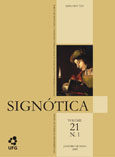Vida do grande Dom Quixote e do gordo Sancho Pança by Antonio José da Silva and Miguel de Cervantes’s Don Quixote de La Mancha: comparative aspects
DOI:
https://doi.org/10.5216/sig.v21i1.8618Abstract
This article focuses on Vida do Grande Dom Quixote e do Gordo Sancho Pança,a play based on the second part of Cervantes’s Don Quixote, which was written
and performed in Lisbon by the Brazilian born New Christian Antonio José da
Silva in 1733. Because the work of the Brazilian New Christian was modeled
on Cervantes’s masterpiece, the analysis departs from a comparative approach
that takes into consideration aspects of the socio-cultural context of Spain
during the late sixteenth and early seventeenth, and that of Portugal during the
first half of the eighteenth century, as well as literary characteristics of both
texts. Since the Luso-Brazilian writer who admired Cervantes is still unknown
to many within and outside the Portuguese-speaking world, before delving into
the comparisons of their literary works and the societies that engendered their
texts, the study will also focus on biographical aspects of Antonio José da
Silva, and on the impact of his work on the literary canon.
Downloads
Download data is not yet available.
Downloads
Published
2010-01-08
How to Cite
COSTIGAN, Lúcia Helena. Vida do grande Dom Quixote e do gordo Sancho Pança by Antonio José da Silva and Miguel de Cervantes’s Don Quixote de La Mancha: comparative aspects. Signótica, Goiânia, v. 21, n. 1, p. 89–102, 2010. DOI: 10.5216/sig.v21i1.8618. Disponível em: https://revistas.ufg.br/sig/article/view/8618. Acesso em: 28 feb. 2026.
Issue
Section
Article
License
Author (s) authorize Signótica to publish an article, if accepted, signing its contribution as original and not submitted to another publisher for publication. In case of acceptance and publication, Signótica's articles are Creative Comons BY-NC-ND (Attribution + Non-Commercial + Non-Derivatives)





1.png)





